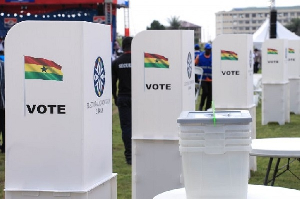Mr. Benjamin Praise Afeku, a lecturer in the Languages Department of the St. Francis College of Education in the Hohoe Municipality of the Volta Region of Ghana has pointed out that the principle of skirt and blouse voting is a tramadol infested philosophy which should be rejected with the rudest vehemence if the country is to make any meaning of and headway in its political forward march, adding that the preposterous concept is preached and endorsed only by the less enlightened in society.
Mr. Afeku, in no uncertain terms descended heavily on those individuals and vociferous groupings who preach skirt and blouse to their unsuspecting followers describing them as unenlightened class of citizens who need to be schooled on the actual interpretation and implications of the controversial phrase which has eaten deeply into the heads of the majority of unenlightened citizens in the country.
According to the distinguished lecturer, he finds it quite intriguing the logic that could inform the decision among a section of the Ghanaian populace most especially students at the tertiary level who should know better to adopt and endorse skirt and blouse as a means of voting in preference to the straight dress mode, considering the former's pool of dicey implications not only on the individual, society or constituency but by extension on the nation at large.
Mr. Benjamin Praise Afeku said "Skirt and blouse voting" which had become a common phenomenon among a section of the electorate in Ghana and the sub-region was an obsolete phrase in Ghanaian politics which typically refers to a voting pattern where a voter chooses a presidential candidate from one political party and a parliamentary candidate from another political party. Stated differently, it is a voting process where a voter decides to vote for a presidential candidate from Party ( A) and a parliamentary candidate from Party (B).
Obviously, the phrase is a metaphorical expression that simply means splitting one's vote between two different parties. A consideration of the whole concept and a critical examination of its political implications, has left one to wonder whether it is sour grapes or sheer ignorance that should occasion a voter's decision to engage in that "Skirt and Blouse* thing of a vote.
"Skirt and blouse voting" can have dicey implications on our political fortunes in Ghana The problems that are likely to pop up include: split loyalty, political instability, reduction in party unity and cohesion, difficulty in policy implementation and many more.
As mentioned earlier, the major problem that is very likely to arise with the skirt and blouse method is split loyalty: Voting for different parties at the presidential and parliamentary levels can create divided loyalties, making it challenging for parties to maintain a united front.
Instability in the political landscape is another striking change to. If the presidential and the parliamentary candidates are from different parties, it can lead to conflicts and difficulties in policy-making, potentially destabilizing the government. Reduction in party unity cohesion cannot be overlooked if the method for voting is Skirt and Blouse: "Skirt and blouse voting" can weaken party unity, as some members may prioritize personal interests over party loyalty.
Skirt and blouse voting could occasion difficulty in implementing policies. With different parties holding power at different levels in a country, it may be challenging to implement policies and programs, potentially hindering progress and development.
Another striking problem with the concept is political polarization. This imperative to note that the skirt and blouse voting pattern can exacerbate political divisions, leading to increased polarization and potential social unrest.
Undermining party structures is one of the challenges that the concept of skirt and blouse yields: "Skirt and blouse voting" can erode the traditional party hierarchy and structures, potentially leading to internal conflicts and power struggles. Fast forward, skirt and blouse voting also impacts on party funding. Split voting can affect party funding, as sponsors may be hesitant to support parties with divided loyalties.
We can also observe that it potentially reduces accountability. With different parties in power at different levels, accountability and oversight may become more complicated, potentially leading to corruption and abuse of power. Overall, "skirt and blouse voting" can lead to political fragmentation, instability, and challenges in governance, potentially impacting Ghana's political fortune and development.
All the above and other juicy points are the reasons for which nobody who has his head well screwed on his shoulders should opt for skirt and blouse electioneering process.
Having said that, it would not be far from the truth to say that very few of the Ghanaian citizenry like Honourable Samuel Okudzeto Ablakwa and few others across the political landscape have distinguished themselves over the years as true patriots whose loyalty to the state could never be compromised in anyway and whose shoulders could be leaned on in such instances, they are one out of a thousand.
Therefore, those who are allowing themselves out of shere ingorance to be misled by a section of the infantile MCE and DCEs to wote skirt and blouse should wise up.
Do not allow any one time MCE or DEC who has his palm kenel cracked by benevolent spirit cloud your right sense of judgement and draw you into their type of complicated 1+1= 3 philosophy.
They have no intention of helping you. They only need your vote to jump out from a sinking boat in pursuit of a job to satisfy their parochial ambition for the next four years, nothing more...
Click to view details



Opinions of Monday, 29 July 2024
Columnist: Benjamin Praise Afeku
Skirt and Blouse Voting: A baseless political fanaticism
Entertainment

















